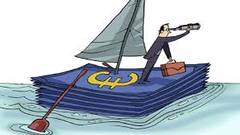
Following the agreement reached by the Council on the single resolution mechanism for dealing with failed banks (link to the news on that), EP President Martin Schulz issued a warning to EU ministers in a speech at the opening of theCouncil summit in Brussels on December 19. According to Mr. Schulz, the banking union risks missing its goals under plans put forward by the EU’s finance ministers.
Many analysts and officials, including of the top of the European Central bank, have also shown their concern since the completion of the banking union might have fallen short of the goal. The banking union can only be successful if there is a consolidated European approach but instead national governments and private investors will bear the responsibility of dealing with banks that are experiencing difficulties.
The idea of a banking union in the EU ran into trouble and confronted important obstacles when Germany put the brakes on and tried to the discussion about how to pay for the rescue of problematic banks. The initial solution focused on completely taking the supervision and resolution of European banks out of the hands of the national authorities. In fact, the ECB will assume direct oversight of the Eurozone’s 130 largest banks late next year and will have ultimate responsibility for all 6,400 banks.
Martin Schulz pointed out that in the transition phase the resolution system is based on national funds instead of a single resolution system. Over the course of the first ten years, the Single Resolution Fund will combine pots of national money under an EU umbrella, which “contradicts the fundamental idea of the banking union: banks should come to the rescue of banks”. The President of the European Parliament thus warns that “ultimately, taxpayers will once again have to come to the rescue after all”. Seeing as the system still leaves a lot of the responsibility with the member states, Schulz urged the Commission to be the ultimate winding-up authority over banks under the supervisory mechanism.
Anticipating difficult times in the forthcoming trialogue negotiations with the Parliament and the European Commission before a final agreement can be reached, Schulz added that the process will be “very long, very difficult, very complicated” since the adoption of the agreed text “will not only fail to have positive effects, it could have negative ones”.
Please read here Martin Schulz speech.
